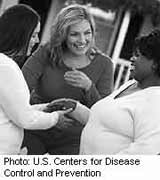Correlations also seen for being overweight, obese in adulthood, being underweight at age 18
FRIDAY, Sept. 11, 2015 (HealthDay News) — Body mass index (BMI) at age 18 years, weight change since age 18, and weight in adulthood correlate with fecundity, according to a study published online Sept. 8 in Obstetrics & Gynecology.
Audrey J. Gaskins, Sc.D., from the Harvard T.H. Chan School of Public Health in Boston, and colleagues examined whether BMI at age 18 and change in weight since 18 years correlated with fecundity. Data were included for 1,950 women in the Nurses’ Health Study 3 currently attempting pregnancy.
The researchers found that for every 5-kg increase in body weight from age 18, there was a 5 percent increase in the current duration of pregnancy attempt. The adjusted median current duration was 0.5 months shorter for those who lost weight, 0.3 months longer for those who gained 4 to 19.9 kg, and 1.4 months longer for those who gained 20 kg or more, compared with women who maintained weight (P trend ≤ 0.001). For a 5-kg/m² increase in current BMI, the adjusted time ratio was 1.08. Being underweight at age 18 years correlated with longer current duration of pregnancy attempt compared with normal-weight women, after multivariable adjustment (time ratio, 1.25). No correlation with fecundity was seen for being overweight or obese at 18 years.
“Gaining weight in adulthood, being overweight or obese in adulthood, and being underweight at age 18 years were associated with a modest reduction in fecundity,” the authors write.
Full Text (subscription or payment may be required)
Copyright © 2015 HealthDay. All rights reserved.








